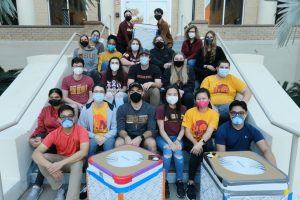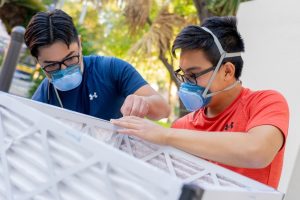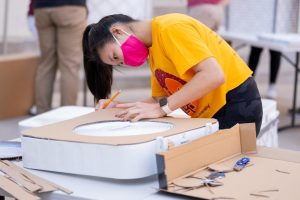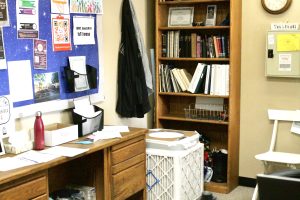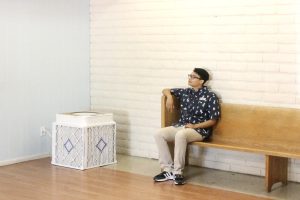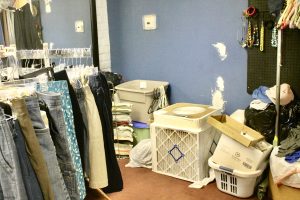- Slug: BC-CNS-Free Filtration Boxes. 720 words.
- Photos available (thumbnails and captions below).
By Oakley Seiter
Cronkite News
PHOENIX – Being homeless in the hottest large city in the United States can be fatal. According to Maricopa County’s 2022 Heat Deaths Report, more than half of all heat-related deaths in Maricopa County last year were unhoused people.
That makes cooling centers crucial safe spaces for unhoused people to escape the heat for periods of time.
Some centers offer more than just a place to cool down. First United Methodist Church of Mesa has an outreach program, Friends at First, that includes a cool-down room, clothing closet, food pantry and shower facility.
“The cool-down room is so important because there’s an increasing number of people who don’t have anywhere to go. There’s nowhere that you can go to just, like, hang out, especially in the summer and the hottest parts of the day,” said Jess Brown, secretary of the church. “Most people are looking for a safe place to just exist. Especially if you’re trying to get off the street or trying to stay sober or something. It’s a safe place where people can go during the day.”
The spread of COVID-19 can make the small, enclosed spaces of cooling rooms dangerous for this vulnerable community.
The Arizona Infectious Disease Epi (AIDE) Lab at Arizona State University offered a solution: Corsi-Rosenthal (CR) boxes. These boxes promote clean indoor air for mitigation of disease as a low-cost and effective alternative to commercial High Efficiency Particulate Air (HEPA) filters.
“They’re sort of a DIY air filtration unit made of four residential air filters that you can buy at any hardware store, with a box fan and some duct tape,” said Megan Jehn, infectious disease epidemiologist who leads the AIDE lab. “They’re just taped together and the fan kind of draws the air in through the filters, filters out all the particles, and then blows clean air out through the top of the fan.”
She said the boxes filter out indoor pollutants like dust, wildfire smoke and respiratory particles that carry diseases like COVID or the flu.
The idea came from Jim Rosenthal, owner of a filter manufacturer and distributor, and Richard Corsi, dean of the College of Engineering at University of California, Davis. Jehn said her lab adopted this idea in 2021 because they saw a lot of COVID-19 outbreaks in schools and wanted to come up with a solution to help kids get back in the classroom; so, they started the Clean Indoor Air Project. She built the boxes with students, tested them, researched the science behind them and distributed them to schools that couldn’t afford a major overhaul of their ventilation system.
“There’s a lot of science there suggesting that they’re (CR Boxes) highly effective, if not even more effective than many commercial air filters,” Jehn said. “Just adding one of these boxes could potentially reduce aerosol exposure by approximately 70 percent.”
It wasn’t until this summer that the lab expanded the project to cooling centers as they saw an increase in wildfire smoke and heat-related illnesses, Jehn said.
The lab has distributed over 400 boxes to schools and cooling centers across metro Phoenix over the past two years.
The ASU lab found out about the Friends at First outreach program through the Arizona Heat Relief Network and the First United Church of Mesa received three CR boxes a couple months ago, according to Brown. They have one box located in the clothing closet, one in the cool-down room and one in the front office.
“When you’re outside on the street, all you’re doing all day long is breathing in car exhaust, (smoke from) forest fires and that kind of dustiness that goes on in Arizona,” Brown said. “The air quality of a city is just bad in general, so I think that the boxes are so important to be able to provide the breath of fresh air that people are looking for.”
Brown said she can tell the difference in the air quality and that it provides reassurance to the clients and people they serve.
“People think it’s a really cool idea because after COVID, people have really become more increasingly aware of air quality inside and outside. It’s something that people get really excited about actually,” said Brown. “I have a weakened immune system so I’m grateful for the boxes and grateful that people are still interested in preventing COVID.”
For more stories from Cronkite News, visit cronkitenews.azpbs.org.
